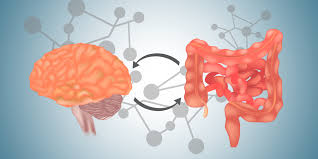Exploring the Gut-Brain Connection: How Your Diet Affects Your Mood

Gut-Brain Connection:
The phrase “you are what you eat” has taken on a deeper meaning in recent years, as research continues to uncover the profound ways in which our diet influences our mental health. The connection between our gut and our brain, often referred to as the gut-brain axis, plays a crucial role in regulating our mood, emotions, and overall mental well-being. In this blog, we will delve into the science behind the gut-brain connection and explore how what we eat can significantly impact our mood.
Understanding the Gut-Brain Axis
The gut-brain axis is a complex communication network that links the central nervous system (CNS) with the enteric nervous system (ENS), which governs the gastrointestinal tract. This bidirectional system allows the brain to influence gut function and vice versa. Key players in this communication include:
- Vagus Nerve: This major nerve connects the brainstem to the gut, facilitating direct communication.
- Neurotransmitters: Chemicals such as serotonin and dopamine, produced in both the brain and the gut, play vital roles in mood regulation.
- Microbiota: The trillions of microbes residing in our gut produce numerous substances that can influence brain function and mood.
The Role of Gut Microbiota
Gut microbiota, the community of microorganisms living in our digestive tract, is central to the gut-brain connection. These microbes produce short-chain fatty acids (SCFAs), vitamins, and neurotransmitters that can affect brain function. For instance, about 90% of the body’s serotonin, a neurotransmitter crucial for mood regulation, is produced in the gut.
Inflammation and Mood
Chronic inflammation is another critical link between diet and mood. A diet high in processed foods, sugars, and unhealthy fats can lead to increased inflammation throughout the body, including the brain. This inflammation has been associated with a higher risk of depression and anxiety.
How Diet Affects Mood: The Evidence
Probiotics and Prebiotics
Probiotics are live beneficial bacteria, while prebiotics are non-digestible fibers that feed these bacteria. Both have been shown to have mood-boosting effects. For example, a study published in Psychiatry Research found that participants who took probiotics reported lower stress levels and improved mental outlook.
Omega-3 Fatty Acids
Found in fatty fish, flaxseeds, and walnuts, omega-3 fatty acids are known for their anti-inflammatory properties and ability to support brain health. Studies have shown that individuals with higher omega-3 intake have a lower risk of depression and anxiety.
Antioxidants
A diet rich in fruits and vegetables provides antioxidants, which help combat oxidative stress and inflammation. Research published in Nutritional Neuroscience suggests that antioxidants can help improve mood and cognitive function.
Refined Sugars and Processed Foods
High intake of refined sugars and processed foods is linked to a higher incidence of mood disorders. These foods can cause spikes and crashes in blood sugar levels, leading to irritability, anxiety, and mood swings. Moreover, they can promote inflammation and negatively alter gut microbiota.
Practical Tips for a Mood-Boosting Diet
Incorporate Fermented Foods
Fermented foods like yogurt, kefir, sauerkraut, and kimchi are rich in probiotics that can help maintain a healthy gut microbiome. Regular consumption of these foods can support a positive mood and reduce symptoms of depression and anxiety.
Choose Whole Foods
Opt for whole grains, lean proteins, and plenty of fruits and vegetables. These foods provide essential nutrients that support brain health and help regulate mood.
Limit Sugary and Processed Foods
Reducing your intake of sugary snacks, sodas, and highly processed foods can help stabilize your blood sugar levels and reduce inflammation, leading to better mood stability.
Include Omega-3-Rich Foods
Incorporate sources of omega-3 fatty acids into your diet, such as salmon, mackerel, chia seeds, and walnuts. These fats are crucial for brain health and can help mitigate symptoms of mood disorders.
Stay Hydrated
Proper hydration is often overlooked but is vital for overall health, including mental well-being. Dehydration can impair cognitive function and negatively impact mood.

Conclusion
The intricate relationship between our gut and brain underscores the importance of a healthy diet for mental well-being. By understanding and nurturing this connection, we can take proactive steps to enhance our mood and overall mental health through the foods we eat. Incorporating probiotics, omega-3 fatty acids, antioxidants, and whole foods while limiting processed and sugary items can make a significant difference in how we feel both mentally and physically. As research continues to unravel the complexities of the gut-brain axis, one thing remains clear: a healthy gut contributes to a healthy mind.















